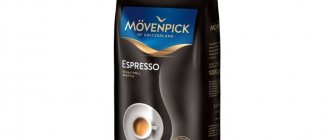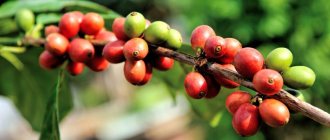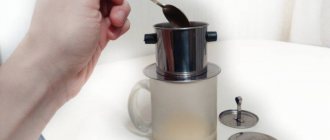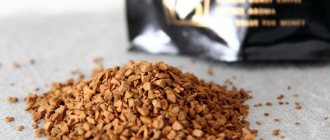Children love to imitate adults so much that this often manifests itself not only in words and behavior, but also in culinary preferences and habits. If your baby sees you pouring yourself a fragrant cup of coffee every day, sooner or later he will ask you to let him try this drink too. And here the question arises: at what age and can children drink coffee? What are the consequences of a strong drink, even with milk, for a fragile body? Let's figure it out.
Why children should not drink natural coffee
The main component of coffee, caffeine, is the strongest catalyst. When consuming an extracted coffee drink from natural beans, it enters the body in significant quantities.
Coffee can make a baby nervous, whiny, or simply get excited by any minor action. The systematic intake of caffeine into a fragile body develops persistent sleep disturbances. Nervous excitement is very unsafe due to excessive consumption of energy, and therefore nutrients. So, drinking coffee at an early age leads to delayed physical development and disturbances in the normal psychological state, including:
- Violation of salt metabolism. As a strong diuretic, caffeine promotes frequent urination, which in turn flushes a huge amount of necessary substances from the body.
- Heart rhythm failure. Caffeine can cause arrhythmia. This condition causes discomfort or chest pain.
- Increased secretion of gastric juice and the development of early gastritis.
How can you change coffee for kids?
Against the background of this picture, the answer to the question “what do they give children in kindergarten?” becomes obvious. Children receive a substitute or coffee substitute. The drink contains natural ingredients of plant origin - barley, chicory, acorns, soy. All ingredients mix well together and taste good individually. Almost always, the products are fried and finely crushed before use.
In the store you can find ready-made powder substitutes. Their recipes were developed in distant socialist times and remain constant to this day. All components are completely non-hazardous, because 100% natural. You can purchase the extract in retail chains (less commonly, in a hypermarket). The following names can be found on the packaging:
- "Morning". Barley-rye mixture with a small part of chicory;
- "Evening". Roasted barley grain only;
- "Fragrance." Drink made from roasted barley and chicory;
- “Golden Ear”, “Summer”. Chicory and barley in equal parts.
It is better for children to replace coffee with chicory
Coffee is the best dessert in the world
Coffee is often used in the preparation of sweets and various confectionery masterpieces. Why don’t you try to turn such a seemingly familiar drink into a real sensation and, one might even say, a full-fledged dessert?
Making cheese coffee:
Brew two spoons of natural coffee in a cezve, heat 50 ml of cream, add a couple of teaspoons of cream cheese and a spoon of powdered sugar, pour the mixture with hot coffee and beat thoroughly with a blender. Add a little sugar and enjoy a new taste of your favorite drink with the whole family.
Coffee is an insidious drink that, while helping to cheer us up, raises blood pressure, causes headaches and insomnia when consumed frequently. It is not recommended to drink coffee more than 2 times a day for adults, let alone children. Until the age of 14, this drink should not be in the diet of the younger generation. Not long ago we wrote about tea for children. It's time to talk about coffee and its substitutes for our kids.
Because Since coffee is contraindicated for children due to its caffeine content, alternatives must be sought. Some mothers wonder why do this, because there is a large selection of other safe and healthy drinks. The fact is that sooner or later, acquaintance with coffee will happen. Instead of banning this drink, it is better to introduce its surrogate, accustoming it to the taste.
The modern food industry offers a wide variety of coffee substitutes for children.
Coffee drink:
This coffee does not contain caffeine, but contains plants (soy, rosehip, chicory). These herbs are very beneficial for the baby’s health: they help regulate intestinal flora, improve appetite, increase immunity and calm the nervous system. The chicory drink is enriched with vitamins B, A, C and D. Another option is a drink with barley. In addition to a large number of useful substances, this drink has a diuretic and tonic effect. A barley drink is especially recommended in order to normalize hormonal balance, water-salt metabolism and blood circulation. Barley drink also helps prevent breast diseases. These coffee substitutes can be given to children from two years of age.
Photo from the site www.TelPics.ru
Cooking method:
Pour the coffee drink into boiling water and stir. Let sit for a few minutes. You can add milk and sugar.
Varieties of coffee drinks: barley, barley-rye, barley-chicory, barley-rye with chicory. How to choose a drink:
The most important things are written on the packaging, so you need to study it carefully. There are often cases when, along with herbs, a small percentage of natural coffee is also included in the composition. In this case, the packaging states how much caffeine it contains. Even if there is a small amount of an invigorating substance, it is still better to refuse it.
You can find Belarusian fortified coffee drinks on store shelves. All raw materials are natural and manufactured in our country. Coffee substitutes are made by mixing rye, oats and barley beans. These drinks are a source of vitamins - B7, C, B5, E, B6, B2, B1, B12, etc.
Photo from the site www.coopinhal.ru
You can make coffee for children yourself. The aromatic drink is made from Jerusalem artichoke, tubers of the earthen pear. If you dig up the tubers in the fall, they can be used all year for making drinks. You just need to peel the tubers, cut into pieces, place in boiling water for 3 minutes, and then dry in the oven. After this, the Jerusalem artichoke needs to be ground in a coffee grinder. The composition is ready to use! This drink will be especially useful for children who suffer from diabetes.
If your baby doesn’t like all the coffee substitute options, then offer him cocoa. The taste of chocolate has never left anyone indifferent. This drink, of course, contains fewer nutrients than natural substitutes, but all children like cocoa.
Coffee protects cells from damage and the body from aging. How to make a healthy coffee drink
To drink or not to drink? Coffee is not a dietary product and therefore is not suitable for everyone due to health reasons. However, this does not mean that coffee is a harmful product. Moreover, coffee not only tastes good, it also has beneficial properties. The results of recent studies have found an explanation for this phenomenon, why people feel more alert after a cup of coffee. It turns out that roasted grains release hydrogen peroxide, a very powerful substance that protects cells from damage and the body from aging. That's why people feel the tonic effect.
However, coffee is beneficial only in small quantities - 1-2 cups per day. It is not for nothing that peoples who have preserved a long-standing culture of drinking this drink use special utensils for coffee - small cups.
Now let’s touch on the features of coffee that make it dangerous in the case of certain diseases. Digestion of coffee in the stomach requires a large amount of gastric juice, which is released in the first 15-20 minutes after drinking this drink.
Therefore, people with gastritis or stomach ulcers should avoid it. And the caffeine content in coffee makes it dangerous for patients with cardiovascular diseases if they consume it in large quantities.
What should people do who love coffee, are accustomed to it, but, given their health problems, cannot drink it without undesirable consequences. There is a way out - prepare a coffee drink according to an individual recipe. It will not only be tasty, but also original and healthy.
Children's coffee drink - the word coffee is exclusively in the title
Making a children's coffee drink using this powder is completely harmless due to the lack of caffeine. In addition, all plant components from the barley-chicory drink are rich in vitamins and minerals. For example, vitamin C, group B, iron, calcium. A huge amount of coarse fiber in the extract perfectly normalizes the microflora of the intestinal tract.
Some of the latest industrial recipes may contain coffee bean extract, coffee flavoring, and more. Typically, they serve as flavor enhancers and their percentage is less than 1-2%.
Fundamentally! It is necessary to carefully read the composition on the packaging if the issue of coffee availability is fundamentally important to the buyer.
Children's coffee prepared in kindergarten contains milk and sugar in addition to the substitute. That’s why it’s worth considering that all that’s left of the coffee in the nursery coffee drink is the title.
Recipes for making a coffee drink
The traditional recipe for making a children's coffee drink is quite simple. It is still used in preschool institutions, according to the established menu card.
A clear dose of goods per serving:
- Pasteurized milk 50 g;
- Purified water 60 g;
- Surrogate coffee powder - 5 g;
- Granulated sugar 5 gr.
To make a children's coffee drink, add a dose of substitute powder to boiling water and boil for 3-5 minutes. Then strain, combine with milk and sugar, and boil again for less than 2-3 minutes.
Barley coffee recipe
Making a coffee drink based on a purchased extract is optional. There is a simple and affordable recipe that is easy to implement at home.
For the drink you need to take 3 tbsp. spoons of barley grain. You should take the largest, undamaged grains without chips or mold stains. They need to be thoroughly washed under running water and dried. Then the grain is fried in a very hot frying pan for 5-7 minutes or until the grain is quite dark. After cooling, the barley is crushed in a coffee grinder and a “coffee” drink is prepared using the usual method. To do this, boil the purchased powder with 200-250 grams of boiling water and simmer for 3-5 minutes. To improve the taste, honey, sugar, and cinnamon are added.
If the taste of untainted grain seems disgusting to your child, you can experiment with additional ingredients. Among them there may be dry rose hips, fried soybeans or acorns.
Acorns must be collected in late autumn, when they are fully ripe. The fruits are washed, dried and cleared of rough skin. After which the kernel is crushed and lightly fried. Acorn coffee is a good preventative against scrofula or rickets.
Attention! Dried rose hips have a strong diuretic effect, so its use is not recommended in large quantities.
Chicory root can be successfully replaced with Jerusalem artichoke tubers collected in early spring or late autumn. During this period they contain the greatest amount of necessary substances.
Beneficial features
The invigorating properties of the aromatic drink are provided by caffeine, which has a blocking effect on neurohormones. While taking it, the production of dopamine, which belongs to the group of “happiness hormones,” increases. Caffeine also stimulates a surge of adrenaline, which gives a surge of energy. Under the influence of the drink, the level of glucose in the blood increases, increasing the activity of the entire body. Having experienced similar effects, adults believe that coffee for children will also bring the following benefits:
- the drink helps to get rid of drowsiness faster;
- energizes you for the coming day; relieves the feeling of fatigue during work;
- lifts your mood and increases physical activity;
- stimulates brain activity;
- helps to concentrate attention and remember information faster; reduces the risk of exposure to radiation.
Coffee is recommended for asthmatics and allergy sufferers during periods of illness. But only high-quality natural grain products have all the beneficial properties. There is not as much caffeine in it as it seems, but this is good, because the main share comes from more useful components - fiber, minerals and tannins, protein, sucrose, etc.
How much and how often can a child drink this kind of “coffee”?
Surrogate “coffee” begins to be given to children from the age of 2. The daily intake is less than 200-250 ml per day. You should take an invigorating drink in the first half of the day to avoid overexcitation.
Alternatively, children can be given cocoa with milk or weakly concentrated tea.
Review of 6 coffee drinks.
Doctors do not advise people suffering from diseases of the cardiovascular system to drink natural coffee. But there are coffee substitutes that have no contraindications.
Systematization of coffee drinks will help you realize which drink is worth trying and which one is better not to focus on.
The benefits and harms of caffeine
Caffeine is a natural stimulant whose compounds have a positive effect on the functioning of the brain and central nervous system, blocks fatigue and is therefore popular among people.
Products containing caffeine: tea, coffee, cocoa, Coca-Cola, energy drinks, chocolate.
- Oddly enough, caffeine is useful for those struggling with excess weight because it speeds up metabolism.
- Coffee contains enough antioxidants to fight free radicals in the body.
Coffee drink with chicory
For more than a hundred years, chicory root has been used as a coffee substitute. There are 2 options for these drinks:
- Chicory together with coffee beans;
- Chicory in its purest form.
Due to the absence of caffeine and its sweetish taste, chicory is simply irreplaceable for people with excess weight and diabetes.
Learn about the properties and variety of instant coffee.
Read about how to remove scale from an electric kettle here.
A coffee drink made from chicory should be consumed:
- For vasodilation in vegetative-vascular dystonia;
- As a general tonic;
- For all gastrointestinal dilemmas;
- For constipation;
- For a beneficial effect on the entire circulatory and nervous system;
- For a tonic effect, especially in the morning.
At the same time, chicory can be consumed even by children and pregnant women (for the latter, it helps get rid of heartburn). This coffee drink can be prepared for children as young as 1.5 years old.
It has a general strengthening and antimicrobial effect, also increases appetite and improves immunity.
By the way, it is specifically prepared in kindergartens or schools.
Drink to activate strength and mental activity
Coffee is truly a miraculous drink. It stimulates brain activity, improves memory, allows you to absorb more information, feel cheerful and full of energy, increases endurance and reaction speed, activates the gastrointestinal tract (if you or your baby do not have stomach problems) and simply improves mood .
Of course, you need to follow strict rules, because even an adult, excessively strong coffee in large quantities has a detrimental effect. And a student shouldn’t turn drinking coffee into an everyday ritual; it’s better to come up with a special coffee ritual that will take place once or twice a week and can turn into a real holiday.
Recipe for “activating” coffee:
Coffee drink with barley
Just like chicory, barley is used as an additive to coffee beans or as an independent component of a drink that does not contain caffeine.
Therefore it is recommended for:
- Cardiovascular, nervous and digestive systems;
- Normalization of blood circulation;
- Maintaining hormonal balance;
- Normalization of water-salt metabolism;
- Prevention of breast diseases.
Instant coffee with barley is very easy to use.
You can also use a grain version of barley coffee. It requires the same manufacturing process as our regular coffee beans.
Specifically: grind only before production, cook in a pot over low heat, turn off a few minutes after boiling and let sit until all the grounds have settled.
Expert opinion: “Don’t forbid your child coffee!”
Parenting forums are replete with the most contradictory information: some say that coffee poses a serious danger to children, others advise coffee in small doses because it contains a lot of beneficial properties, and others call for both adults and children to give up caffeine altogether.
According to doctors, there is no need to go to extremes - everything is good in moderation. Pavel Pronichev, general practitioner: “Coffee itself is not harmful to children. The caffeine contained in the drink, of course, excites them and irritates the stomach, but the content of this substance is much higher, for example, in green tea. Therefore, there is nothing wrong with a small cup of weak natural (but not instant) coffee diluted with cream or milk. Soviet pediatrics did not prohibit coffee in children's diets, but did not recommend it either. My eldest son, who is 8 years old, sometimes drinks weak brewed coffee with sugar and milk. If your child is already in school and shows interest in an "adult" morning drink, don't stop him from drinking it. Let him try for his health!”
Coffee based drinks
Now there is a huge number of coffee drinks that are prepared on the basis of coffee. Moreover, they can be served both hot and cool (they are also called cool coffee cocktails).
With all this, the production of coffee drinks requires additional natural ingredients: syrups, honey, chocolate, cocoa, herbs or spices (cinnamon, vanilla, cloves), citrus fruits, whipped cream, milk, and a small amount of alcoholic beverages.
Although there are many recipes for traditional coffee drinks, the development of their production is followed with special care.
The most popular of them:
- Latte is a three-layer drink made of coffee, steamed milk and milk foam in a 1:1 ratio;
- Cappuccino is also a three-layer drink made from coffee, milk and milk foam, but with a different proportion: 1/3 coffee and 2/3 foam;
- Moccaccino is a layered drink made from coffee, grated chocolate, steamed milk and milk foam.
- A classic cool coffee drink is iced, which is coffee with the addition of ice cream.
Love drinks that benefit the body. Then turn your attention to carrot tea!
You will find all the information about the properties and uses of Kuril bush tea here.
Gifts that teachers don't like
The teachers admitted that they are happy with all the gifts that parents bring. Enough attention and nothing more is needed. This is exactly how almost all the kindergarten workers with whom they had the opportunity to communicate described their attitude to congratulations. But still, some of them decided to share their recommendations regarding the choice. They explain this by saying that they are very sorry for their parents’ money, which is sometimes practically “thrown into the trash.” For example, one teacher complained that she was given an expensive panel. The interior of the house was complete; there was also nowhere to hang it in the garden. So it turned out that the money was wasted. The same can be said about the souvenirs that garden employees receive in large quantities.
Julia Roberts' niece Emma is expecting her first child: a new addition to the actress's family
New technologies in Hollywood: the robot became the main actor in the new film
To enjoy cherries without harming your figure, add protein
The shame is that after a short time it is even impossible to remember whose gift it was. Teachers also do not like it when they are given cosmetics, since in this case it is a matter of a certain taste, which is different for everyone. Therefore, such gifts should not be given without prior agreement.
Not everyone agrees with the gift of money, since this is also a very delicate and sensitive issue. Many are categorically against such a gift, since it is ambiguous. But in some cases it is appropriate to give money; you just need to first discuss this issue with the teacher.
One teacher said that she was given a set of pots for indoor plants. She admitted that she felt some awkwardness because she did not understand whether it was a gift to her or so that the pots could decorate the window sills in the kindergarten group.











